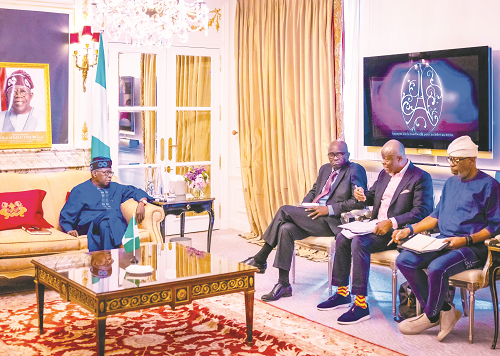
The economic reforms of the Federal Government are attracting more global attention.
At least, three world leaders and some global financial institutions have indicated interest in discussing partnership with President Bola Tinubu in France.
The president arrived in the French capital, Paris, on Tuesday for a two-day New Global Financial Pact Summit, which begins today.
British High Commissioner to Nigeria, Richard Montgomery, who met with Vice President Kashim Shettima yesterday at the Presidential Villa, Abuja said Nigeria was becoming a “big opportunity”.
The Envoy said the feedback from the UK government and the British business community was that the first steps of the administration were well-received.
Shettima urged Montgomery to work towards setting up a Nigeria/UK Bi-national Commission.
Leaders from the United States of America, France, Switzerland and others have indicated interest in meeting with President Tinubu, his Special Adviser on Special Duties, Communication and Strategy, Mr Dele Alake, said.
Alake said the President would push for foreign direct investments.
He told reporters: “Don’t forget that Mr. President has taken some very bold steps in the area of social engineering in the last three weeks, particularly the unification of the multiple exchange rates.
“In the short term, we have noticed and expected that there will be a slight spike in the demand and then, that would affect the value of the naira viz-a-viz the dollar.
“So, apart from the immediate, short and long-term positive effects of that unification policy, there could be a need for an injection of direct foreign exchange into the economy to shore up the value of the naira while market forces stabilise.
“The domiciliary account restrictions have been liberalised. It will build confidence in the foreign exchange system.
“This means people abroad can begin to bring in their money into the economy, even those at home, who have hoarded their dollars for fear of restrictions and all that will now be more encouraged to bring the dollars into the financial system.
“However, with all of these, you still need a direct foreign injection of foreign exchange to build or complement the domestic policies.
“There are several heads of state of developed societies that Mr. President’s policies in the last three weeks really have encouraged.
“These foreign nations and investors have become more interested in the affairs of Nigeria.
“At the last count, about three, four different heads of state of developed countries have indicated willingness to meet with him, have a chat with him and explore areas of cooperation on the economy, on agriculture, on other areas that are salient to the development of Nigeria’s economy. That is generally the essence of this meeting.”
Montgomery, after meeting Shettima, stressed that the policy decisions had placed Nigeria on a higher growth path.
He said: “The big economic decisions being taken by this government are really important and are being noticed around the world: the removal of subsidy; the exchange rate reform, all of that create a much better investment environment.
“I was in London last week; I was briefing my ministers, but I was also talking to British businesses in the finance, banking and investment sectors. They are all responding very positively to these first decisions.”
Shettima called for Nigeria-UK Binational Commission, saying it will strengthen economic relations between both countries.
To Montgomery, he said: “I will urge you to facilitate the setting up of the commission.
“The Bi-national Commission can be the driver for accelerating business relationship between our two countries.”
Shettima underscored the need for economic reforms, saying: “This is just the beginning because it was fait accompli to withdraw the fuel subsidy. We either get rid of the fuel subsidy or the fuel subsidy gets rid of the Nigerian nation.”
On student visa restrictions, Montgomery said UK’s ban on students coming in with dependents was not targeted at only Nigerians, even though they account for a higher percentage of immigrants.
He said: “Last year, for example, the UK granted three million new visas of which 325,000 of those visas were between Nigeria and the UK. So, Nigerian visitors constitute over 10 per cent of the people coming to London and the UK.
“On the issue of students’ visas, I will also like to provide the context; that the number of Nigerian students coming to the UK has increased five folds in the last three years; it is a fantastic success story for our universities and we are really delighted that so many Nigerians are coming to the UK.
“The issue about restrictions of people bringing dependents is not just for Nigeria. Many more students are trying to bring their dependents with them.
“There are two issues here. The first is: it is not always possible to find housing services to meet all the needs of our existing student population.
“Secondly, I think reasonable people will accept that we have to manage our visitor numbers and that we have to manage migration in and out of the UK; just as the Nigerian government does for your own borders.”
Montgomery was accompanied by Deputy Development Director Susan Mshana; Counsellor Lake Chad Basin Alex Maclean; Political Counsellor Jonathan Bacon and Senior Political Advisor Damilola Oyedele.




